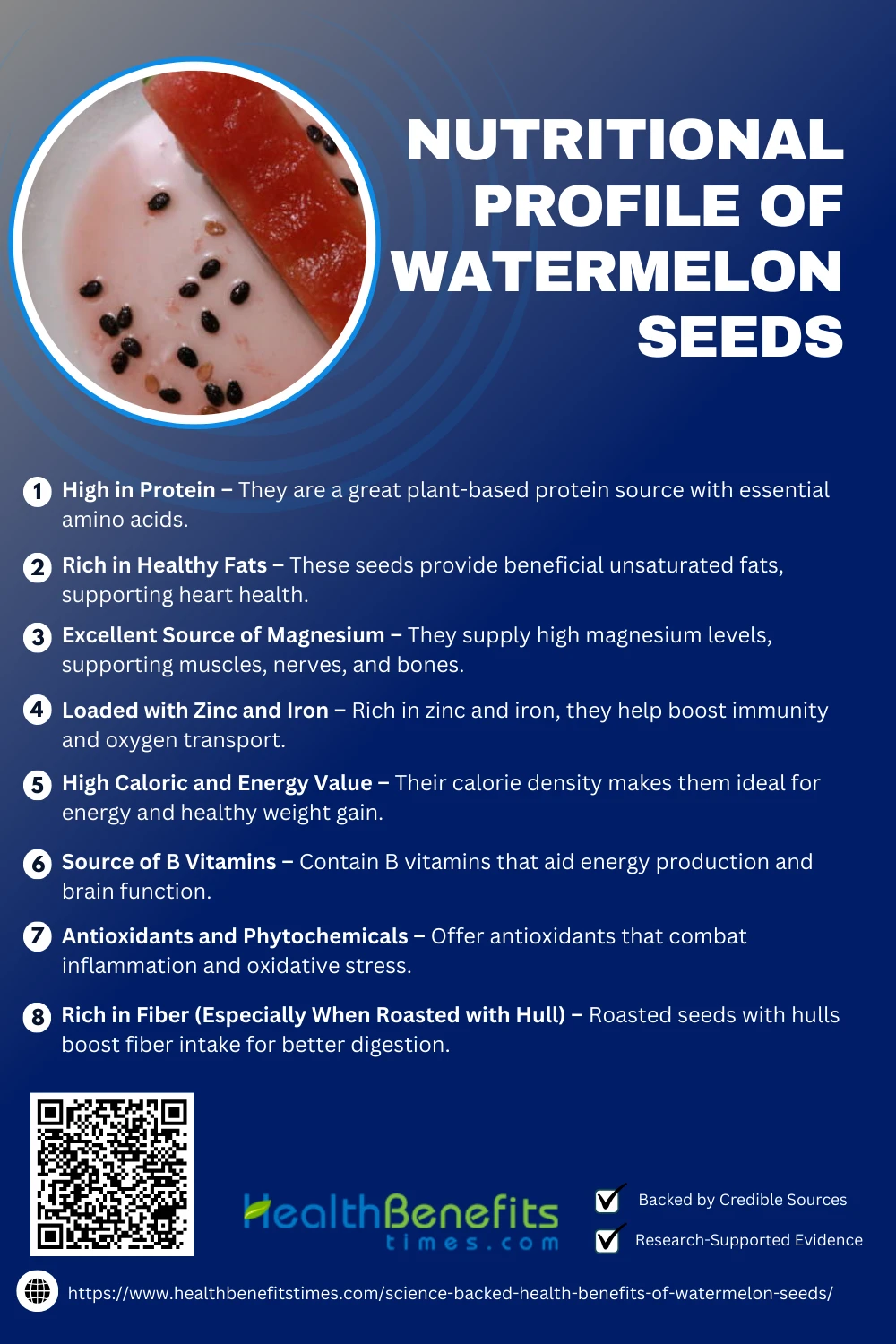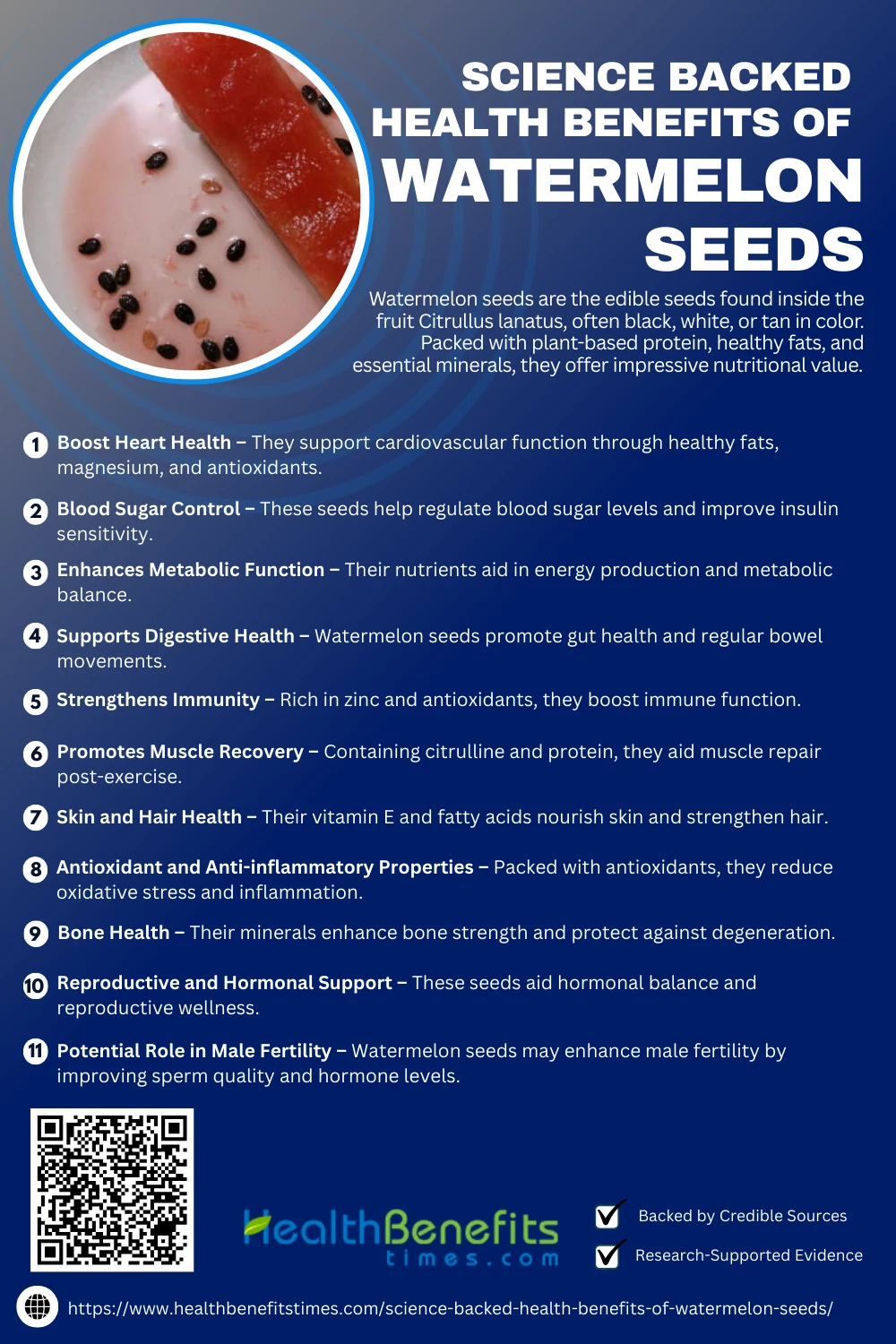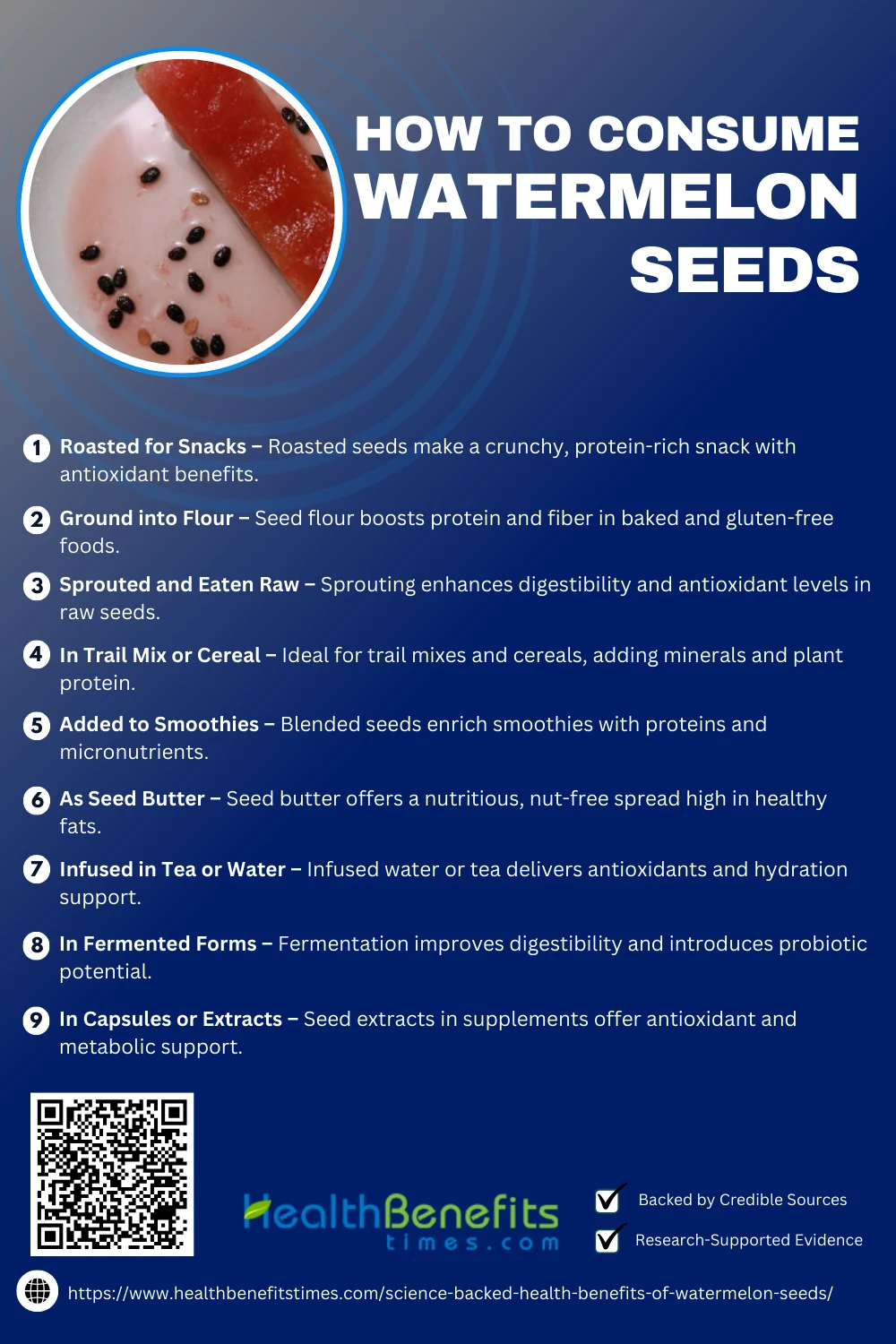- Watermelon seeds are the edible seeds found inside the fruit Citrullus lanatus, often black, white, or tan in color.
- Packed with plant-based protein, healthy fats, and essential minerals, they offer impressive nutritional value.
- Research supports their roles in heart health, metabolism, and as functional ingredients in diverse culinary and medicinal applications.
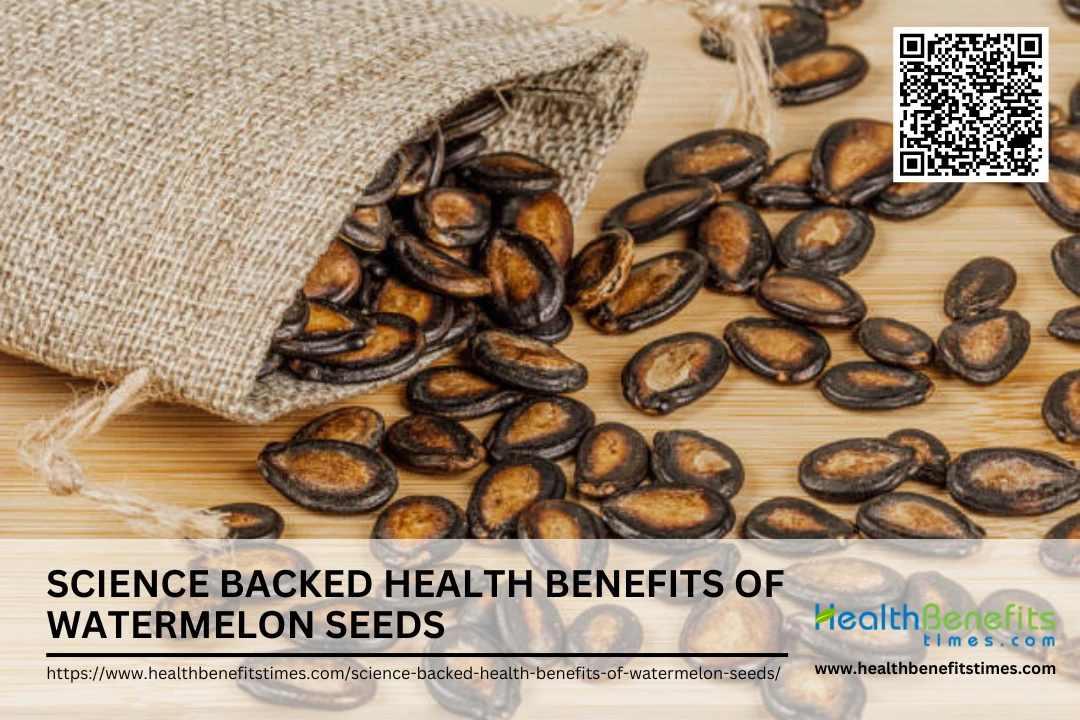 Watermelon seeds are the small, nutrient-rich kernels found within the fruit Citrullus lanatus, often overlooked yet packed with proteins, healthy fats, vitamins, and essential minerals source on composition of edible parts of Cucurbitaceae. Despite their common dismissal as waste, watermelon seeds have emerged in scientific literature as a functional food ingredient with promising health benefits. These seeds are especially valued for their high content of unsaturated fatty acids, plant-based proteins, magnesium, and antioxidants, all of which contribute to various physiological functions. Research highlights that watermelon seeds can aid cardiovascular health, metabolic regulation, and immune support, making them more than just a snack. Additionally, advancements in food science have shown that extraction methods significantly affect the nutritional value of watermelon seed oil, reinforcing the seeds’ role as a potent, natural supplement for health optimization.
Watermelon seeds are the small, nutrient-rich kernels found within the fruit Citrullus lanatus, often overlooked yet packed with proteins, healthy fats, vitamins, and essential minerals source on composition of edible parts of Cucurbitaceae. Despite their common dismissal as waste, watermelon seeds have emerged in scientific literature as a functional food ingredient with promising health benefits. These seeds are especially valued for their high content of unsaturated fatty acids, plant-based proteins, magnesium, and antioxidants, all of which contribute to various physiological functions. Research highlights that watermelon seeds can aid cardiovascular health, metabolic regulation, and immune support, making them more than just a snack. Additionally, advancements in food science have shown that extraction methods significantly affect the nutritional value of watermelon seed oil, reinforcing the seeds’ role as a potent, natural supplement for health optimization.
Nutritional Profile of Watermelon Seeds
Watermelon seeds are packed with essential nutrients, offering a rich source of protein, healthy fats, and important minerals like magnesium, iron, and zinc, making them a surprisingly powerful dietary addition.
- High in Protein
Watermelon seeds are an excellent source of plant-based protein, containing approximately 28–30% protein by weight, depending on the variety and processing method. These proteins include essential amino acids like arginine, which plays a crucial role in immune function and cardiovascular health. This makes them a valuable supplement for vegetarians and vegans. - Rich in Healthy Fats
These seeds are loaded with healthy unsaturated fats, particularly omega-6 fatty acids like linoleic acid, which are beneficial for heart health. The fat content can range from 24% to over 50%, with polyunsaturated fats contributing significantly to their energy density and metabolic benefits. - Excellent Source of Magnesium
Magnesium is essential for over 300 biochemical reactions in the human body, including muscle function and energy production. Watermelon seeds are especially high in magnesium, providing around 140 mg per 100g, which contributes to blood pressure regulation, bone health, and nerve function. - Loaded with Zinc and Iron
Watermelon seeds are packed with essential trace minerals like zinc, which supports immune health and wound healing, and iron, which is crucial for oxygen transport in the blood. A 100g serving can fulfill a substantial portion of daily requirements, especially beneficial for people with deficiencies. - High Caloric and Energy Value
Due to their fat and protein content, watermelon seeds are energy-dense. A typical serving of 100g can provide nearly 550 calories, making them an ideal snack for people needing energy boosts or aiming to gain weight in a healthy way. - Source of B Vitamins
Watermelon seeds contain small but significant amounts of B-complex vitamins, such as niacin (B3), folate (B9), and thiamine (B1). These vitamins are involved in converting food into energy and maintaining brain and nerve health. - Antioxidants and Phytochemicals
Beyond basic nutrition, these seeds contain natural antioxidants and phytochemicals that help neutralize free radicals. These include phenolic compounds that contribute to anti-inflammatory and potentially anti-cancer effects. - Rich in Fiber (Especially When Roasted with Hull)
Although the edible inner kernel has lower fiber, consuming the seeds with their shell or minimally processed increases fiber intake, aiding digestion and gut health. This makes them a dual-purpose food for both nutrition and digestion.
Nutrient comparison (per 100g) with other seeds like pumpkin, sunflower.
| Nutrient | Watermelon Seeds | Pumpkin Seeds | Sunflower Seeds |
| Calories (kcal) | 557 | 559 | 584 |
| Protein (g) | 28.3 | 30.2 | 20.8 |
| Total Fat (g) | 47.4 | 49.1 | 51.5 |
| Saturated Fat (g) | 9.8 | 8.7 | 4.5 |
| Carbohydrates (g) | 15.3 | 10.7 | 20.0 |
| Dietary Fiber (g) | 4.0 | 6.0 | 8.6 |
| Magnesium (mg) | 515 | 592 | 325 |
| Zinc (mg) | 10.2 | 7.8 | 5.0 |
| Iron (mg) | 7.3 | 8.8 | 5.3 |
Science Backed Health Benefits of Watermelon Seeds
Often discarded, watermelon seeds are emerging as a nutritional powerhouse. Backed by science, these tiny seeds offer impressive health benefits ranging from heart support to immune boosting and more.
Watermelon seeds are cardioprotective, rich in magnesium, healthy fats, and arginine, which support vascular relaxation and lipid regulation. Şenol (2023) emphasized their role in modulating cholesterol levels. (1) Silori et al. (2024) highlighted their anti-inflammatory benefits on cardiovascular health. (2) Nadeem et al. (2022) validated their antioxidant richness. (3) Dar et al. (2025) noted reduced lipid peroxidation, while Benmeziane & Derradji (2023) confirmed benefits on heart rate variability and function. (4) (5)
2. Blood Sugar Control
Watermelon seeds are effective in managing blood sugar due to their low glycemic load and high fiber and magnesium content. A recent clinical study by Hong et al. (2024) showed reduced post-meal glucose spikes. (6) Khaki et al. (2013) observed hypoglycemic effects in rats. (7) Silori et al. (2024) supported their metabolic-regulatory role. (2) Benmeziane & Derradji (2023) emphasized enzyme modulation. (5) Dar et al. (2025) linked their polyphenols to improved insulin sensitivity. (4)
3. Enhances Metabolic Function
Watermelon seeds improve metabolic health through active polyphenols and amino acids that modulate cellular energy balance. Usme-Duque et al. (2025) found that fermented extracts increase mitochondrial activity. (8) According to Wang et al. (2023), their influence on bacterial metabolism boosts gut health. (9) Silori et al. (2024) linked antioxidants to lipid metabolism. (2) Benmeziane & Derradji (2023) reported enhanced enzymatic regulation. (5) Additionally, Dar et al. (2025) confirmed modulation of metabolic signaling pathways. (4)
4. Supports Digestive Health
Watermelon seeds promote digestive wellness due to their fiber, protein, and polyphenol content. Şenol (2023) emphasized their role in gut microbiota balance via bioactive peptides. (1) Silori et al. (2024) noted anti-inflammatory effects on intestinal lining. (2) Benmeziane & Derradji (2023) linked fiber to bowel regulation. (5) Dar et al. (2025) demonstrated enhanced enzymatic activity. (4) Furthermore, Hong et al. (2024) observed improved GI comfort with seed consumption. (6)
5. Strengthens Immunity
Watermelon seeds are a potent source of immune-boosting micronutrients like zinc and magnesium, both essential for cellular defense mechanisms. According to San Miguel et al. (2023), they contain antioxidants that neutralize free radicals. (10) Their zinc content, highlighted by Shareef et al. (2024), modulates immune responses. (11) Further, Maheshwari et al. (2022) note bioactive compounds that trigger immunomodulation. (12) Studies also point out antioxidant synergy in seed oil. (13) Lastly, Saeed et al. (2023) emphasize its cardiovascular and immune system benefits. (14)
6. Promotes Muscle Recovery
Watermelon seeds are rich in L-citrulline and magnesium, which are crucial for muscle repair and post-workout recovery. Karla-Segura et al. (2023) explain citrulline’s role in reducing muscle fatigue. (15) Dar et al. (2025) show how protein extracts from seeds support tissue regeneration. (4) As noted by Wiley (2023), the amino acid profile aids contraction. (12) Also, Navida et al. (2022) emphasize anti-inflammatory benefits. (3) Townsend et al. (2022) confirm enhanced muscle oxygenation post-exercise. (16)
7. Skin and Hair Health
Watermelon seeds offer remarkable benefits for skin and hair due to their rich content of linoleic acid and vitamin E. These bioactives contribute to moisture retention and collagen support, as emphasized by San Miguel et al. (2023). (10) Their cosmetic relevance is highlighted in Shareef et al. (2024). (11) Vinhas et al. (2021) confirm their phytochemical richness. (17) According to Nadeem et al. (2022), they stimulate hair growth. (3) Moreover, Ankush et al. (2025) found their extract valuable in skincare formulations. (18)
8. Antioxidant and Anti-inflammatory Properties
Watermelon seeds are a powerhouse of antioxidants and anti-inflammatory agents such as phenolics and tocopherols. According to Dar et al. (2025), these compounds help mitigate oxidative stress and inflammatory markers. (4) Balogun et al. (2024) confirmed reduced cellular damage. (19) Silori et al. (2024) emphasized its preventive role in chronic inflammation. (2) Ankush et al. (2025) noted antibacterial synergy, while Vidak et al. (2024) detailed its use in horticultural byproducts for functional health applications. (18) (20)
9. Bone Health
Watermelon seeds are rich in phosphorus, magnesium, and zinc—minerals essential for bone mineralization and density. According to Demulawa et al. (2024), their inclusion in functional diets promotes skeletal growth. (21) Shareef et al. (2024) found seed extracts to aid calcium absorption. (11) Their anti-inflammatory properties also reduce bone degradation, as shown by Dar et al. (2025). (4) Silori et al. (2024) emphasized their osteoprotective potential. (2) Additionally, Ankush et al. (2025) supported their inclusion in anti-aging supplements. (18)
10. Reproductive and Hormonal Support
Watermelon seeds have been linked to hormonal regulation and improved reproductive health due to their content of zinc, arginine, and phytonutrients. Munglue et al. (2014) demonstrated improved sexual behavior in rats. (22) Awaad et al. (2020) noted significant hormonal balance restoration. (23) Rotimi et al. (2023) confirmed fertility enhancements. (24) Devi et al. (2020) observed increased luteinizing hormone. (24) Moreover, Sun et al. (2017) explored hormonal gene expression linked to seed compounds. (25)
11. Potential Role in Male Fertility
Watermelon seeds enhance male fertility due to their rich content of citrulline, antioxidants, and essential fatty acids. El-Masry & Elsayed (2019) reported improved testicular health and sperm quality. (26) Mohammed & Al-Bayati (2014) observed improved reproductive indices. (27) Khaki et al. (2014) demonstrated increased testosterone levels. (28) Additionally, Munglue et al. (2014) confirmed enhanced sexual behavior. (22) Lastly, Rotimi et al. (2023) supported its use for fertility enhancement in animal models. (24)
How to Consume Watermelon Seeds
Watermelon seeds can be enjoyed in various forms, including raw, roasted, or sprouted. Understanding the best ways to prepare and consume them helps maximize their nutritional and health benefits.
Roasted watermelon seeds offer a crunchy, nutrient-rich snack packed with proteins, healthy fats, and minerals. Studies highlight their antioxidant properties and potential as a plant-based protein source. (29) They compare favorably with traditional nuts in nutrition and show promise in snack food innovation. (30) (31)
2. Ground into Flour
Watermelon seed flour is gaining attention for its high protein and fiber content. It improves nutritional quality in baked goods. Studies show it enhances gluten-free dough properties and supports sustainable food systems. (32)
3. Sprouted and Eaten Raw
Sprouting watermelon seeds boosts nutrient bioavailability and reduces antinutrients, enhancing digestibility. (33) Research highlights increased antioxidant activity post-sprouting. (34) They also retain significant protein and mineral content when consumed raw.
4. In Trail Mix or Cereal
Watermelon seeds are a nutritious addition to cereals and trail mixes, rich in magnesium and plant protein. (35) Research confirms their compatibility with nut-based blends and their shelf-stability in dry snack formats. (36) (37)
5. Added to Smoothies
Watermelon seeds enrich smoothies with plant-based protein and essential micronutrients like iron and magnesium. (38) Blending enhances absorption of antioxidants. (39) Studies also show seed incorporation boosts amino acid diversity in health beverages.
6. As Seed Butter
Watermelon seed butter is a creamy, allergen-friendly alternative to nut butters, offering high unsaturated fat and protein levels. (40) It has excellent spreadability and flavor retention, and meets nutritional standards for plant-based spreads. (41) (42)
7. Infused in Tea or Water
Infusing watermelon seeds in tea or water releases bioactive compounds like polyphenols and amino acids. (43) These infusions exhibit antioxidant and anti-inflammatory effects. (44) Research also supports their hydrating and metabolic health benefits.
8. In Fermented Forms
Fermenting watermelon seeds enhances protein digestibility, mineral bioavailability, and probiotic potential. (45) Studies confirm improved antioxidant activity post-fermentation. (46) Their application in functional fermented foods is gaining traction globally.
9. In Capsules or Extracts
Watermelon seed extracts, rich in antioxidants and essential fatty acids, are increasingly formulated into capsules for health supplements. (47) Studies show benefits in managing oxidative stress and metabolic health. (48) Their phytochemical profile supports therapeutic use (MDPI Seed Extract Review).
Side effects of watermelon seeds
While watermelon seeds offer impressive health benefits, consuming them in excess may lead to unwanted side effects. It’s important to understand these potential risks to enjoy them safely and responsibly.
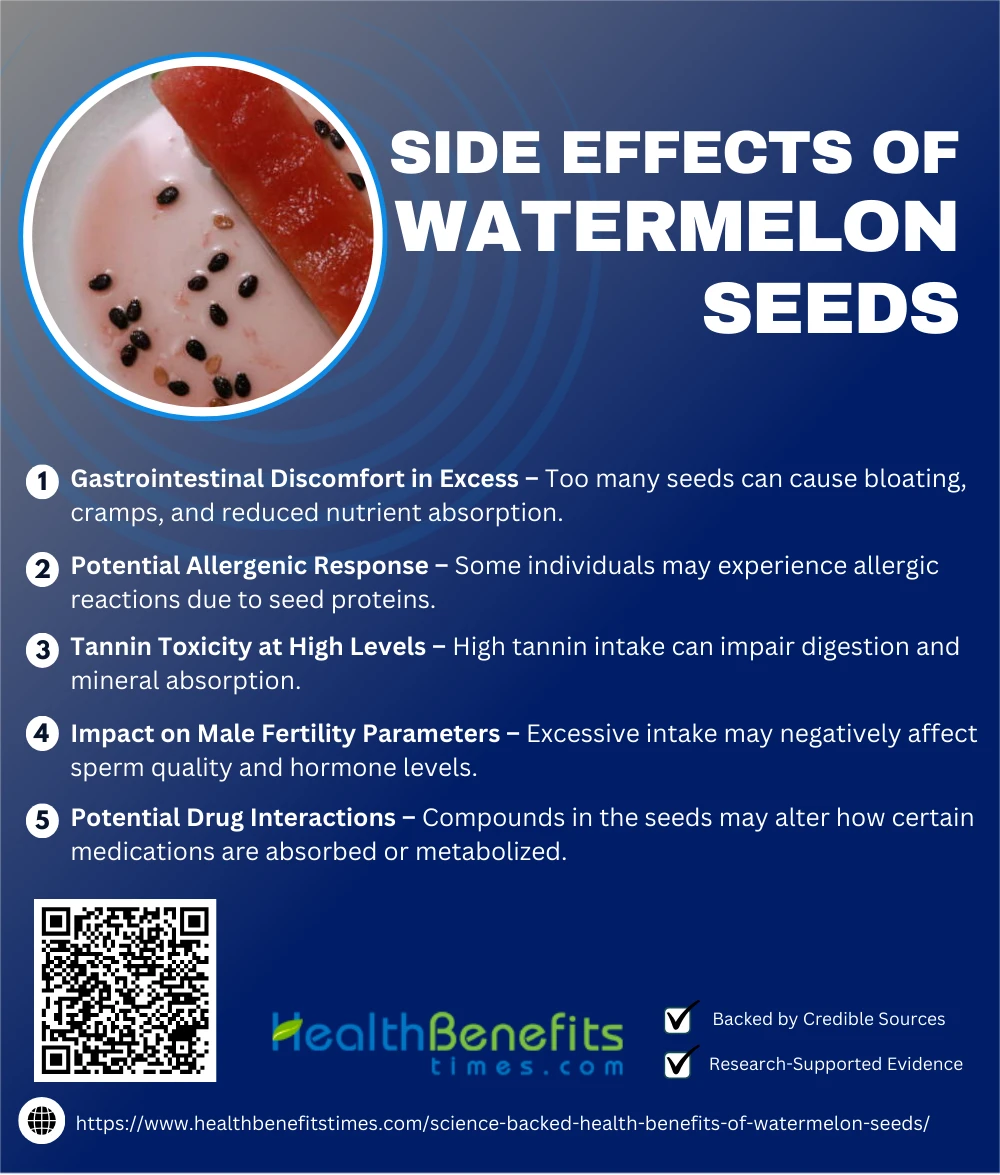 1. Gastrointestinal Discomfort in Excess
1. Gastrointestinal Discomfort in Excess
Excessive consumption of watermelon seeds may lead to gastrointestinal discomfort due to fiber overload and antinutritional compounds like phytates. (49) These compounds can cause bloating or cramps and impair nutrient absorption when ingested excessively. (50) (17)
2. Potential Allergenic Response
Watermelon seeds may trigger allergic responses in sensitive individuals, particularly those with nut or seed allergies. (50) Studies suggest immunogenic proteins can cause hypersensitivity, while rare cross-reactions have been documented in seed-allergy cases. (49) (17)
3. Tannin Toxicity at High Levels
At high intake, watermelon seeds may expose consumers to tannins, which inhibit iron absorption and irritate the gastrointestinal tract. (51) Tannins also interfere with protein digestion. (52) Overconsumption may lead to nutrient imbalances. (17)
4. Impact on Male Fertility Parameters
Excessive intake of watermelon seeds may influence male fertility, altering sperm motility and morphology in animal studies. (53) Research indicates hormonal changes and testicular oxidative stress responses. (54) These effects are dose-dependent. (55)
5. Potential Drug Interactions
Phytochemicals in watermelon seeds may interfere with drug metabolism pathways, especially those involving liver enzymes. (17) Their antioxidant compounds can modulate the bioavailability of pharmaceuticals. (56) Caution is advised when used alongside antidiabetic or lipid-lowering medications. (50)
Myths vs Science
Many myths surround watermelon seeds, from causing appendicitis to being indigestible. Science, however, reveals surprising facts about their nutritional value and safety, separating fiction from proven health insights.
1. Myth: Swallowing Watermelon Seeds Makes a Plant Grow in Your Stomach
This myth is biologically impossible. Seeds require sunlight, soil, and favorable environmental conditions to germinate—none of which exist in the human stomach. Gastric acids destroy seed integrity quickly.
2. Myth: Watermelon Seeds Are Harmful and Should Always Be Removed
Scientific analysis reveals that watermelon seeds are edible and packed with nutrients like magnesium, zinc, and healthy fats. They contribute to dietary protein and essential minerals when roasted or sprouted. Removal is based on habit, not health.
3. Myth: Watermelon Seeds Have No Culinary Value
This belief is outdated. Culinary uses include roasting, grinding into flour, blending into smoothies, or turning into seed butter. They add texture, nutrients, and unique flavor to dishes, while supporting sustainable food systems.
4. Myth: Watermelon Seeds Cause Immediate Health Risks
Scientific studies show moderate intake is safe. However, large quantities may cause digestive discomfort due to tannins and phytates, which can interfere with nutrient absorption. Issues arise with excess—not typical culinary use.
5. Myth: Seedless Watermelons Are Genetically Modified and Safer
Seedless watermelons are created through natural hybridization, not genetic modification. Ironically, they lack the protein- and mineral-rich seeds found in seeded varieties. The myth confuses hybrid breeding with GMO science.
Conclusion
Watermelon seeds are more than just edible—they’re a powerhouse of essential nutrients supported by scientific research. Rich in protein, healthy fats, magnesium, zinc, and antioxidants, they offer numerous health benefits, including improved heart health, enhanced metabolism, better blood sugar control, and support for skin and hair. Studies continue to highlight their role in promoting overall wellness when consumed in moderation. From roasted snacks to nutrient-rich seed flour, their versatility adds to their value. However, like any food, balance is key. Incorporating watermelon seeds into a healthy diet can be a smart, science-backed way to boost your nutritional intake naturally.


